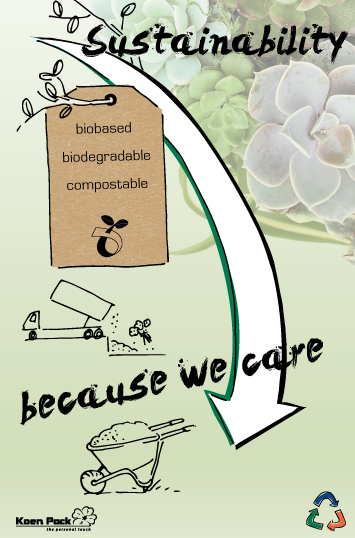What is the difference between compostable, biodegradable and biobased?
You see and hear it everywhere; horticulture also needs to become more sustainable. More people are asking for compostable, biodegradable and biologic products. Consumers have an increasing amount of attention for sustainability and the environment. With biodegradable, biobased and compostable growth- and packaging material a grower can respond to this. In practice it seems there is some confusion about the difference between the terms compostable, biodegradable and biobased. That is why we are happy to explain the differences here.
Biologic products
The confusion often starts with the term 'organic'. An organic product is a product of organic origin. An example of an organic product is, for example, an organic fertilizer or unsprayed fruit and vegetables. These are products that are entirely made up of natural raw materials of vegetable or animal origin. In the EU, a product may be called organic if it has a SKAL certification or an EKO quality mark. (Links in Dutch)

Biodegradable
Biodegradable (also called compostable) means that a product or packaging can degrade on a natural way by fungus and bacteria to water, CO2 and methane. It says nothing about the speed with which this happens and under what circumstances. Biodegradable products may therefore not just go into the green waste container. For example, cork, cotton, hair and pieces of wood are all biodegradable, but the degradation takes a very long time.
There are also plastics that are biodegradable. Contrary to what many people think, biodegradable plastics are currently not degradable in nature or in fermentation plants.
Previously, biodegradable plastic packaging that meets the European standard EN-13432 was allowed to be thrown away in the green waste. According to that standard in The Netherlands, a packaging must be able to be broken down for at least 95 percent within 6 weeks in an industrial composting installation. You can recognize these packages by the Seedling logo or the OK Compost logo.
In recent years, the processes of composting installations have been greatly accelerated. The plastic no longer breaks down fast enough and remains in the compost. Plastic packaging with the Seedling logo or the OK compost logo can therefore no longer be thrown away in the green waste, but belongs to the residual waste. An exception has been made for compostable waste bags, which are allowed in green waste bins. Source: Meldpunt Verpakkingen (Dutch)
Can all compostable packaging (EN 1342) be added in the kitchen and garden waste bin?
It is advised to only add compostable packaging to the organic waste if these are a 'carrier' of organic waste. For example, it could be a compostable garbage bag full of kitchen waste or a compostable cellophane around a (spoiled) cucumber. Compostable packaging adds nothing to the produced compost. The compostable plastic is converted into water and carbon dioxide during the composting process. The added value of the compostable packaging is therefore mainly in the easy 'transport' of organic waste to the organic waste bin (and thereby increasing the separation efficiency of organic waste). Source: BVOR (Dutch)
Are biobased and biodegradable the same?
No, the terms "biobased" and "biodegradable" mean something else. Biobased refers to the raw material from which a product is made, while biodegradable refers to the final phase of the product. Biobased means that the product is made from renewable, natural resources, such as corn or potatoes. Examples of this are plastic types based on sugars or sugar cane (such as PLA plastic). Biobased products are not always biodegradable. Source: Meldpunt Verpakkingen (Dutch)
Quick links to other pages
Homepage
Sustainability with Koen Pack
Koen Pack Waste policy and processing techniques
The environmental impact of packaging, do you opt for paper or plastic?
To the webshop
Request Sample Book
Frequently Asked Questions
What does Koen Pack do itself?
Dictionary Sustainability
